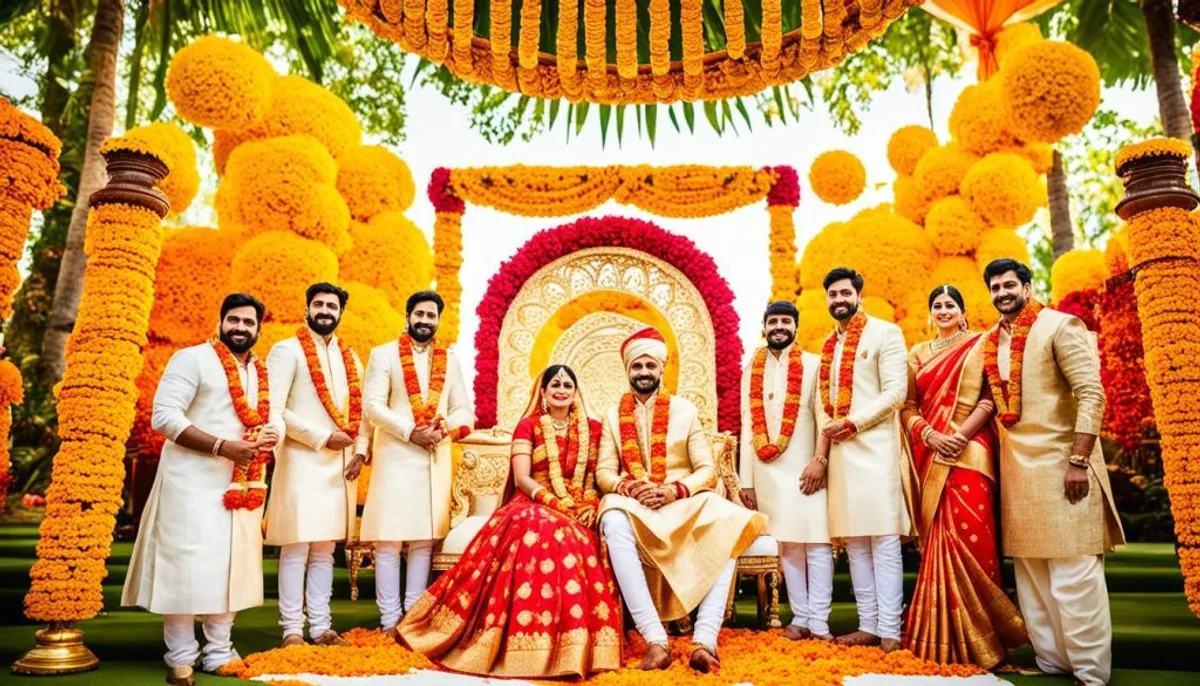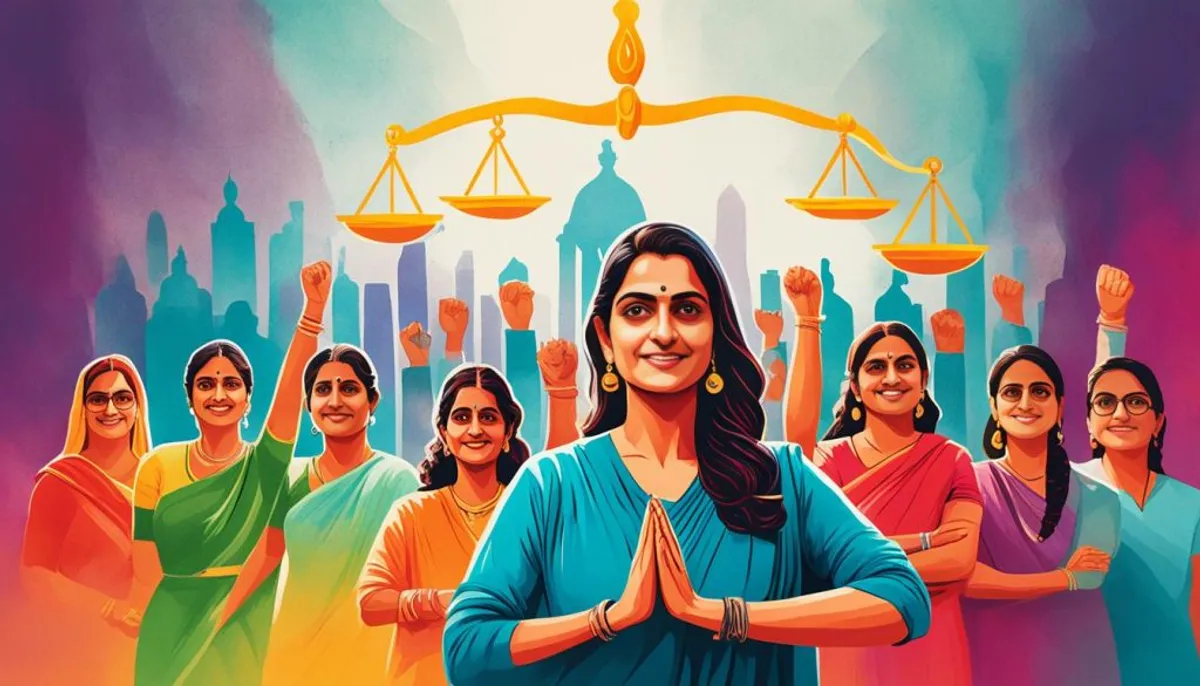Starting a new life together is thrilling, especially for Saudi couples planning their wedding in Kerala, India. This guide aims to make the process easier, focusing on the special needs of Non-Resident Indian (NRI) couples. It’s designed to help you celebrate your marriage in Kerala smoothly and successfully.

This guide covers legal requirements for NRI marriages and the rich cultural traditions of Kerala. It helps you plan your dream wedding, whether it’s a religious or civil ceremony. We’ll guide you through the steps, making sure you know what to do and what documents you need. By the end, you’ll feel ready and confident to handle the details of a Kerala marriage, making your union joyful and legally solid.
Introduction to Kerala Marriages
Kerala is a state in southern India known for its rich culture and traditions. For Non-Resident Indians (NRIs), especially those from Saudi Arabia, marrying in Kerala can be complex. They need to understand the laws, rules, and cultural norms for a smooth marriage.
Importance of Legal Awareness for NRI Marriages
Kerala marriage registration and kerala marriage laws are key for NRI couples. The legal rules for nri marriage in india differ from what they’re used to. It’s vital to know about kerala inter-religious marriages to avoid problems.
Challenges Faced by Saudi Couples Marrying in Kerala
Saudi couples marrying in Kerala face unique challenges. They must deal with cultural differences, language barriers, and official hurdles. It’s important to understand local customs, traditions, and laws for a smooth marriage and life together.
By tackling these challenges and learning about the legal system, Saudi couples can have a happy and successful kerala marriage. This guide will cover the specific needs and things to consider for NRI marriages in Kerala. It aims to help readers make informed choices and feel confident throughout the process.
how to marriage in kerala
In India, a religious marriage is seen as legal, but you must also register it officially in most states, including Kerala. For NRI couples, you need both a religious ceremony and legal registration. This is key for things like immigration and visas. This guide will help you with both the religious and civil marriage steps in Kerala. It makes sure your marriage is legal in India and other countries too.
Religious Marriage Ceremonies for NRI Marriage Registration
Kerala’s kerala marriage ceremonies and kerala wedding traditions show its rich culture. If you’re an NRI couple planning a religious marriage in Kerala, here’s what to do:
- Get a marriage license from the local registrar’s office.
- Plan a traditional Hindu, Muslim, or Christian ceremony, based on your beliefs.
- Register your marriage with the religious authorities after the ceremony.
- Get a marriage certificate from the religious group.
Civil Marriage Ceremonies in India for NRI Marriage Registration
For NRI couples wanting a civil marriage in india, the steps are a bit different:
- Apply for marriage registration at the local registrar’s office.
- Provide documents like proof of identity, address, and affidavits.
- Have a meeting with the registrar to check the details.
- Get a marriage certificate after successful registration.
Choosing a religious or civil ceremony, make sure your kerala marriage procedures follow Indian laws. This is especially important for NRI couples. It ensures your marriage is legally recognized in India and your home country.
Personal Laws of Marriage and Divorce in India
India is a diverse country with many personal laws for marriage and divorce. These laws depend on the religion and culture of the people involved. The Hindu Marriage Act, the Christian Marriage Act, the Muslim Marriage Act, and the Parsee Marriage and Divorce Act are some of these laws.
For NRI couples, knowing the laws that apply to their marriage and divorce is key. These laws change based on the couple’s religion and culture. It’s important to follow these laws to avoid legal problems.
| Personal Law | Applicability |
|---|---|
| Hindu Marriage Act | Applies to Hindus, Sikhs, Jains, and Buddhists |
| Christian Marriage Act | Applies to Christians |
| Muslim Marriage Act | Applies to Muslims |
| Parsee Marriage and Divorce Act | Applies to Parsees (Zoroastrians) |
It’s vital for NRI couples to understand India’s marriage and divorce laws. These laws affect their legal rights and duties. By learning about these laws, couples can make their marriage and divorce process smoother and legally correct.
Requirements for Saudi Nationals Marrying Foreigners
Saudi nationals who want to marry foreign nationals, like Indian citizens, must follow certain rules. It’s important for Saudi couples planning to marry in Kerala or India to know these rules.
Age Limits and Age Difference Requirements
Saudi nationals must meet strict age rules when marrying foreign spouses. The requirements for saudis marrying foreigners say the Saudi must be 18 or older. The foreign spouse must be 16 or older. Also, the age difference between them can’t be more than 20 years.
Income and Accommodation Requirements
Income and accommodation requirements for saudi nri marriages focus on financial stability and living conditions. Saudi nationals need a minimum monthly income of 5,000 Saudi Riyals (about $1,300 USD). They also need to show they have good living places for the marriage.
Documentation and Security Clearances
Getting the right documentation and clearances for saudi nri marriages is key. Saudi nationals must get documents like birth certificates and proof of income. They also need security clearances from authorities in Saudi Arabia and India. These steps make sure the marriage meets legal standards in both countries.
| Requirement | Details |
|---|---|
| Age requirements for saudi nri marriages | Saudi national: 18 years or older Foreign spouse: 16 years or older Maximum age difference: 20 years |
| Income and accommodation requirements for saudi nri marriages | Minimum monthly income: 5,000 Saudi Riyals (approx. $1,300 USD) Proof of suitable living accommodations |
| Documentation and clearances for saudi nri marriages | Birth certificates, proof of income, security clearances from authorities in Saudi Arabia and India |

Legal Rights of NRI Spouses in Kerala
As a Non-Resident Indian (NRI) spouse, you have certain legal rights in Kerala and India. It’s important to know these rights to protect your marriage, whether you’re from Saudi Arabia or another country.
One key right is the right to property. NRI spouses share equal ownership and control over property bought during the marriage. This includes homes, money, and other things you own together.
Also, NRI spouses can get maintenance and alimony if you separate or divorce. The court will look at your finances, how you lived during the marriage, and the needs of any kids.
When it comes to child custody, NRI spouses have equal rights. The court thinks about what’s best for the child. They look at the child’s happiness, who can take care of them, and their growth.
If you’re in a fight with your spouse or facing domestic violence, you can get help. You can go to court, social services, or groups that help NRI spouses in Kerala and India.
Dealing with legal issues as an NRI spouse can be tough. But knowing your rights helps protect you and get a fair outcome in any marriage problems.
Matrimonial and Maintenance Rights for Women
In Kerala, women, including NRI spouses, have important rights in marriage. These rights protect and support women’s well-being and financial needs during and after marriage. They are based on Indian laws.
Rights to Custody of Children
Women in Kerala have the right to keep custody of their kids. They can make decisions on their children’s care, education, and well-being. Courts look at what’s best for the child when deciding on custody.
Women can also ask for financial support from their spouses during marriage and after separation. This support is key for the woman and her kids’ well-being. The amount depends on the spouses’ finances and the woman and children’s needs.
Women in Kerala also have laws against domestic violence and marital disputes. These laws help women get protection, compensation, and support if they face abuse or mistreatment at home.

It’s important for Saudi couples marrying in Kerala to know these rights. This knowledge helps women understand their legal rights and make smart choices for their future. Knowing these rights helps women protect themselves in legal issues or marital problems.
Verification of Antecedents and Documents
Planning a marriage, especially for NRI couples, means checking the background and documents of the future spouse. This guide will help you make sure all the information is correct and current before you get married.
The process of verification of antecedents and documents for nri marriages in kerala includes a detailed check of several things:
- Personal Identification Documents: Make sure birth certificates, passports, and other ID documents are real and valid.
- Educational and Professional Credentials: Check the education and work history of the future spouse.
- Financial Stability and Income Sources: Look into the financial stability and where the income comes from.
- Criminal and Legal Background Checks: Find out if there are any criminal records or legal problems.
- Social and Familial Connections: Check the social and family ties to avoid any surprises.
By carefully checking the verification of antecedents and documents for nri marriages in kerala, you can trust the information. This helps make the marriage process safe and successful.
| Document | Verification Requirement |
|---|---|
| Birth Certificate | Confirm the authenticity and accuracy of the birth details. |
| Passport | Verify the validity and match with the provided personal information. |
| Educational Certificates | Ensure the qualifications and credentials are genuine and up-to-date. |
| Employment Records | Validate the professional background and income sources of the prospective spouse. |
| Criminal History | Conduct a thorough background check to identify any past legal issues. |
Conclusion
The Kerala Marriage Guide for Saudi Couples has given a full look at the legal needs, cultural ways, and steps to get married in Kerala, India. It helps Saudi couples understand the unique issues they face, including the legal marriage requirements for foreigners, and the laws that apply. This way, they can go through the marriage process with ease and make their marriage in Kerala a success.
This guide talks about the legal knowledge needed and the problems Saudi couples might face. It also covers the steps for marriage registration, both religious and civil. It makes sure Saudi couples know what they need to plan, including updating will after marriage, and have a happy marriage in Kerala. It also talks about the legal rights of NRI spouses and their rights in marriage and maintenance.
By using this detailed guide, Saudi couples can easily go through the marriage process in Kerala. They can also respect the local traditions and customs. This mix of Saudi and Indian cultures can make their marriage happy and meaningful. It will also bring the two nations and their people closer together.
RelatedRelated articles



